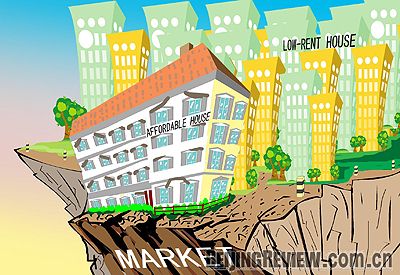|

Affordable houses emerged in China during the process of the country's housing reform. They were formally launched in 1998 and developed rapidly between 1999 and 2005, as a kind of housing relief for people in the low-income group. According to state regulations, buyers of affordable houses only have limited ownership of their properties, which cannot be resold within five years of the purchase.
But it seems the honeymoon was short. Since 2005, complaints about affordable housing have grown: The houses are always remotely located and are excessively large in size. Illegal sales of affordable houses are also frequently reported.
Since the latter half of 2008, many provinces have begun to scrap the affordable housing program. Instead, local governments turned to expanding the low-rent housing program by purchasing apartments from real estate developers and subsidizing low-income homebuyers. Supporters believe the policy change is reasonable, because, as a result of the economic slowdown, commercial housing prices in many cities are almost the same as affordable houses.
Opponents, however, argue that housing prices have not seen a sharp drop around the country. Therefore, if the affordable housing program is scrapped, housing prices, which remain very high, are likely to rebound.
Some economists say that affordable housing is a product of the planned economy, which conflicts with market economy rules. Furthermore, affordable housing is unlikely to cover all those who are in need of shelter. If it is granted to some, then it's unfair for others. Therefore, the government should concentrate on the development of low-rent housing, because this is a more flexible system. People are allowed to live in low-rent houses only when they are confirmed as low-income earners; once their incomes are above the designated threshold, they have to leave to make room for those in need.
Low-rent better option
Chun Hua (Zhujiang Evening News): I always believe that the end of the affordable housing program is only a matter of time. This special housing relief program provided by the government has done little to benefit low-income families.
The logic here is simple: No matter how cheap the affordable houses are, they cannot be accessible to all low-income families.
Today, affordable houses are sold for no less than 4,000 yuan ($580) per square meter around the country. South China's Guangzhou is an economically developed city, where households whose annual per-capita income is 18,287 yuan ($2,613) are allowed to purchase affordable houses. In many other cities the threshold is lower. However, after deducting expenditures for food, clothes, health care and other living necessities, there is little left for a down payment. It is reported that after moving into affordable houses, many already poor families become even more trapped when they find they don't even have enough money to buy food.
The Chinese have long been used to the custom of living in their own homes, but it's impossible to provide houses to all low-income families. Even if it's possible, it's unfair to middle-income earners. Should they be deprived of affordable houses just because they earn more?
Therefore, the best way out is to provide more low-rent houses. After all, low-rent houses are within the financial capacity of most low-income families. When they become better off, they can improve living conditions by purchasing commercial houses. This system makes it impossible for the privileged class to take advantage.
Zhao Yong (Chengdu Evening News): China has a complicated housing security system that consists of low-rent houses, affordable houses and price-capped houses. It would not be so complicated, if all those who are unable to afford commercial houses can live in low-rent houses provided by the government.
If the government is ready to invest enough money in the low-rent housing program to expand its coverage to all low-income families in need, doing away with the affordable housing program will make the housing security system more effective and less complicated. The demand for commercial houses will also be boosted.
Sheng Xiang (Wuhan Evening News): Affordable housing is a special welfare benefit. The cheap houses fulfill many low-income families' dream of owning their own homes.
Actually, from the perspective of equality and fairness, affordable houses are not as good as low-rent houses. Why was the affordable housing system so popular with local governments? One of the key reasons is that they do not need to really invest money in the program, except for exempting some taxes on developers to help the latter slash construction costs and thus lower housing prices. But low-rent houses require the government's investment. Of course, the opportunities for taking bribes and other forms of corruption are many in the case of the affordable housing program.
Once commercial housing prices drop, the advantage of affordable housing won't be so obvious, and they become unmarketable.
Negative impacts
Gu Jianfa (Oriental Morning Post): A major reason to call off the affordable housing program is that housing prices and sales in many cities are declining. In some cities, the prices of commercial houses are almost the same as affordable houses'. To do away with the affordable housing program will boost the lackluster housing market. However, the negative impacts of doing so are obvious.
| 